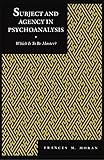Subject and Agency in Psychoanalysis : Which Is to Be Master? / Frances Moran.
Material type: TextSeries: Psychoanalytic Crossroads ; 4Publisher: New York, NY : New York University Press, [1993]Copyright date: ©1993Description: 1 online resourceContent type:
TextSeries: Psychoanalytic Crossroads ; 4Publisher: New York, NY : New York University Press, [1993]Copyright date: ©1993Description: 1 online resourceContent type: - 9780814754825
- 9780814763261
- 150.1952
- BF175.M635
- online - DeGruyter
| Item type | Current library | Call number | URL | Status | Notes | Barcode | |
|---|---|---|---|---|---|---|---|
 eBook
eBook
|
Biblioteca "Angelicum" Pont. Univ. S.Tommaso d'Aquino Nuvola online | online - DeGruyter (Browse shelf(Opens below)) | Online access | Not for loan (Accesso limitato) | Accesso per gli utenti autorizzati / Access for authorized users | (dgr)9780814763261 |
Browsing Biblioteca "Angelicum" Pont. Univ. S.Tommaso d'Aquino shelves, Shelving location: Nuvola online Close shelf browser (Hides shelf browser)
restricted access online access with authorization star
http://purl.org/coar/access_right/c_16ec
Psychoanalysis works with words, words spoken by a subject who asks that the analyst listen. This is the belief that underlies Francis Moran's rewarding exploration of a central problem in psychoanalytic theory-namely, the separation of the concepts of subject and agency. Subject and Agency in Psychoanalysis contends that Freud simultaneously employs two frameworks for explaining agency-- one clinical and one theoretical. As a result, Freud's exploration of agency proceeds from two logically incompatible assumptions. The division between these assumptions is a part of Freud's psychoanalytic legacy. Moran reads the Freudian inheritance in light of this division, showing how Klein and Hartmann's theoretical concepts of subject are adrift from the subject who speaks in analysis. Moran also shows that while Lacan's subject provides more focus on this issue, Lacan reverts to the Freudian division in his use of logically contradictory assumptions concerning the location of agency. Drawing on contemporary theory development, from Lacanian innovations to the social theories of Anthony Giddens, Moran proposes a new and fertile approach to a fundamental problem, significantly narrowing the gap between psychoanalytic theory and practice.
Mode of access: Internet via World Wide Web.
In English.
Description based on online resource; title from PDF title page (publisher's Web site, viewed 01. Nov 2023)









